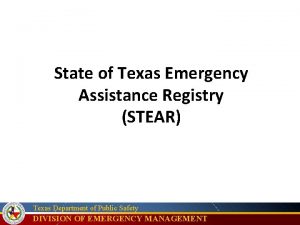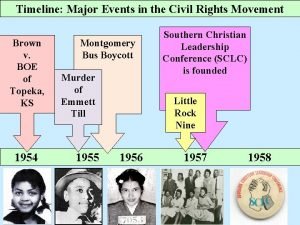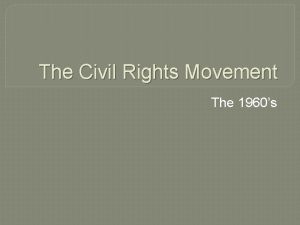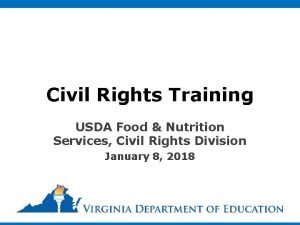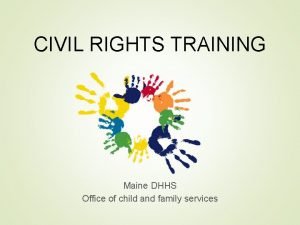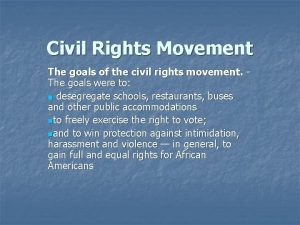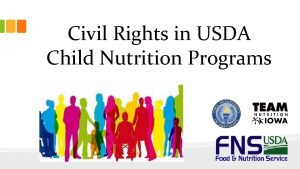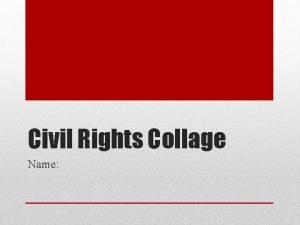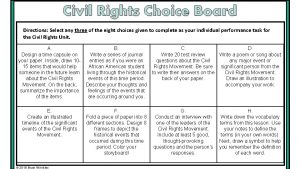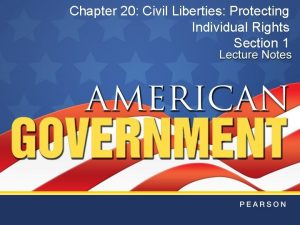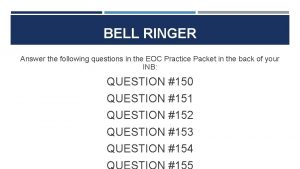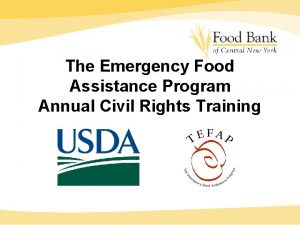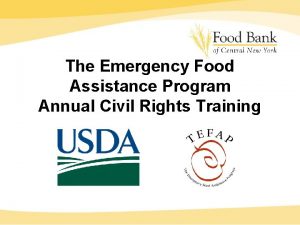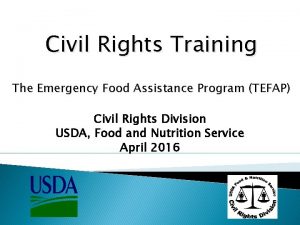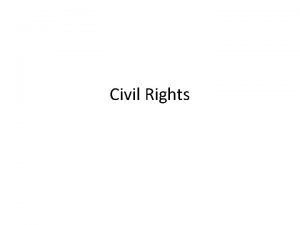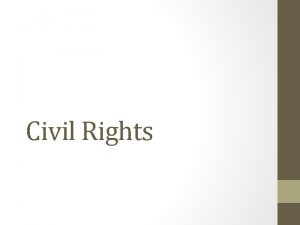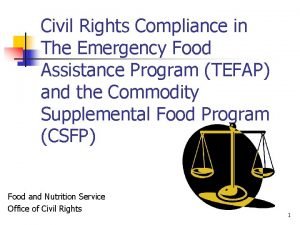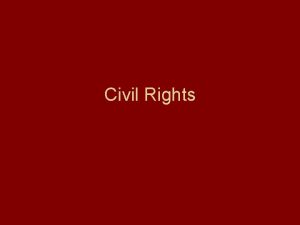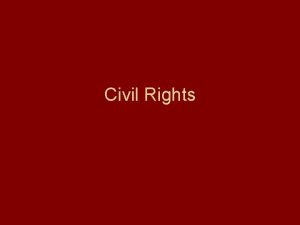The Emergency Food Assistance Program Annual Civil Rights


















- Slides: 18

The Emergency Food Assistance Program Annual Civil Rights Training

Topics Covered Civil Rights Compliance Review Techniques Non Discrimination Statements Public Notification Systems Complaint Procedures Resolution of Noncompliance Reasonable Accommodations for Persons with Disabilities Requirements for Language Assistance Conflict Resolution Customer Service

Civil Rights Compliance *Staff and Volunteers at all TEFAP eligible sites MUST receive Civil Rights Training* • All persons that directly deal with guests and/or handles confidential information is required to receive this training annually • The Training Must Include the following topics: – – “And Justice For All” Poster Complaint Procedures Limited English Proficiency (LEP) Reasonable Accommodations for Disabled Persons • Acceptance of “Federal financial assistance, ” no matter how minimal, requires the recipient agency to assure compliance with Federal civil rights laws and requirements – This includes TEFAP – USDA Foods, funding and equipment

What is Discrimination? The 6 federally Protected Classes for TEFAP are: Discrimination is defined as: • Race, Sex, Color, Age, National Origin, and Different treatment which Disability makes a distinction of one person or a group of persons from others; either intentionally, by neglect, or by the actions or lack of actions based on…

Nondiscrimination Statement NEW – The entire USDA Nondiscrimination Statement must be visible at sign-in tables, included on All information materials and sources, printed materials. (Original Format) including websites, to inform the public about the distribution of TEFAP/USDA foods, must contain a nondiscrimination statement. It is not required that the nondiscrimination statement be included on every page of the program information or website. At the minimum, the nondiscrimination statement, or a link to it, must be included on the first or home page of the program information.

Elements of Public Notification State agencies and their sub-recipients must: • Make program information available to the public upon request; • Prominently display the “And Justice for All” poster; • Inform potentially eligible persons, applicants, participants and grassroots organizations of programs or changes in programs; • Convey the message of equal opportunity in all photos and other graphics that are used to provide program or program-related information; • Provide appropriate information in alternative formats for persons with disabilities and in the

USDA Nondiscrimination Statement • In accordance with Federal civil rights law and U. S. Department of Agriculture (USDA) civil rights regulations and policies, the USDA, its Agencies, offices, and employees, and institutions participating in or administering USDA programs are prohibited from discriminating based on race, color, national origin, sex, disability, age, or reprisal or retaliation for prior civil rights activity in any program or activity conducted or funded by USDA. • Persons with disabilities who require alternative means of communication for program information (e. g. Braille, large print, audiotape, American Sign Language, etc. ), should contact the Agency (State or local) where they applied for benefits. Individuals who are deaf, hard of hearing or have speech disabilities may contact USDA through the Federal Relay Service at (800) 877 -8339. Additionally, program information may be made available in languages other than English. • To file a program complaint of discrimination, complete the USDA Program Discrimination Complaint Form, (AD-3027) found online at: http: //www. ascr. usda. gov/complaint_filing_cust. html, and at any USDA office, or write a letter addressed to USDA and provide in the letter all of the information requested in the form. To request a copy of the complaint form, call (866) 632 -9992. Submit your completed form or letter to USDA by: Mail: U. S. Department of Agriculture Fax: (202) 6907442; or Office of the Assistant Secretary for Civil Rights E-mail: program. intake@usda. gov 1400 Independence Avenue, SW **This institution is an equal opportunity provider.

USDA Nondiscrimination Statement (Spanish) • • • De conformidad con la Ley Federal de Derechos Civiles y los reglamentos y políticas de derechos civiles del Departamento de Agricultura de los EE. UU. (USDA, por sus siglas en inglés), se prohíbe que el USDA, sus agencias, oficinas, empleados e instituciones que participan o administran programas del USDA discriminen sobre la base de raza, color, nacionalidad, sexo, discapacidad, edad, o en represalia o venganza por actividades previas de derechos civiles en algún programa o actividad realizados o financiados por el USDA. Las personas con discapacidades que necesiten medios alternativos para la comunicación de la información del programa (por ejemplo, sistema Braille, letras grandes, cintas de audio, lenguaje de señas americano, etc. ), deben ponerse en contacto con la agencia (estatal o local) en la que solicitaron los beneficios. Las personas sordas, con dificultades de audición o discapacidades del habla pueden comunicarse con el USDA por medio del Federal Relay Service [Servicio Federal de Retransmisión] al (800) 877 -8339. Además, la información del programa se puede proporcionar en otros idiomas. Para presentar una denuncia de discriminación, complete el Formulario de Denuncia de Discriminación del Programa del USDA, (AD-3027) que está disponible en línea en: http: //www. ascr. usda. gov/complaint_filing_cust. html y en cualquier oficina del USDA, o bien escriba una carta dirigida al USDA e incluya en la carta toda la información solicitada en el formulario. Para solicitar una copia del formulario de denuncia, llame al (866) 6329992. Haga llegar su formulario lleno o carta al USDA por: Correo: U. S. Department of Agriculture Fax: (202) 690 -7442 Office of the Assistant Secretary for Civil Rights Correo Electrónico: program. intake@usda. gov. 1400 Independence Avenue, SW Washington, D. C. 20250 -9410;

And Justice for All Poster **Agencies MUST display in a prominent location for all to view • Poster reflects current Nondiscrimination Statement, new graphic, and updated complaint contact information. • It must be displayed when/where distributing TEFAP/USDA Foods. • Current copies are available by contacting your respective Agency Relations Coordinator.

Complaint Procedures • Any person has the right to file a complaint within 180 days of the alleged discriminatory action. • Ask the client or participant, if they need assistance in completing the form. • Every effort should be made to have the complainant provide information found on the complaint form. • Complaints may be written, verbal, or anonymous. • If the person making the complaint does not want to put it in writing, the person receiving the complaint must complete a written report for them to the best of their ability. • A Civil Rights Complaint Form is available in the FNS Instruction 113 -1 of from the USDA website: https: //www. ascr. usda. gov/sites/default/files/Complain_combined_6 _8_12_508_0. pdf

Complaint Procedures Complaints may be sent directly to: U. S. Department of Agriculture Office of the Assistant Secretary for Civil Rights 1400 Independence Ave. SW Washington, DC 20250 -9410 Toll Free (866) 632 -9992 (Voice) Individuals who are hearing impaired or have speech disabilities may contact USDA through the Federal Relay Service at: (800) 877 -8339

Compliance Review State Agency and Food Bank must conduct compliance reviews and ensure civil rights requirements are followed. This may include observation, interviews, documentation review and other techniques If agency is found to be non-compliant: Agency must complete corrective action Cease inappropriate actions Institute appropriate procedures to ensure compliance Failure or refusal to comply will result in loss of Federal assistance from all Federal sources

Limited English Proficiency (LEP) • Clients that speak little or no English must receive the same service as English speaking clients regardless of language or cultural barriers. • People with Limited English Proficiency (LEP) need to be served in their language or provided free interpretation services • Contact TEFAP Coordinator if interpretation services (CTS Language Link) are needed • Volunteers may be used, if the volunteer can maintain the participant’s confidentiality! • When a guest brings a friend or relative for interpretation, the interpreter should be at least 18 years of age • See www. lep. gov for resources and information

American Disabilities Act (ADA) Public accommodations (businesses and non-profit organizations) must provide goods and services to people with disabilities on an equal basis with the rest of the public. Check US Dept. of Justice, ADA Homepage for guidelines and specifics www. ada. gov

Access for People with Disabilities Have ADA plan in place (or plan to assist) Parking lot, entrances and exits, halls, elevators, restrooms, etc. Sign language, interpreters, Braille signage, service animals Alternative arrangements for service

Conflict Resolution Have a written and posted policy for dealing with unacceptable behavior, conflicts, and complaints Get help, especially if the situation escalates, becomes threatening or possibility of violence Explain acceptable behavior for service Remain calm Listen to complaints objectively

Customer Service Remember the Golden Rule • Be patient & polite • Smile when appropriate – make people feel welcome and valued • Be empathetic. Understand that people may not know the ‘rules’. They may feel uncomfortable asking for help. • Avoid sarcasm • Explain program policies and procedures • An apology can go a long way, even if you don’t feel you’re at fault • Avoid ‘having the last word’

Additional Resources • General TEFAP Information: www. fns. usda. gov/fdd/programs/tefap • Civil Rights Compliance Requirements http: //www. fns. usda. gov/sites/default/files/1131. pdf • Limited English Proficiency (LEP): www. lep. gov • ADA: www. ada. gov
 Civil rights and civil liberties webquest
Civil rights and civil liberties webquest Texas department of public safety
Texas department of public safety Civil rights timeline of events
Civil rights timeline of events Civil rights sitins
Civil rights sitins Mother of the modern day civil rights movement
Mother of the modern day civil rights movement Postwar prosperity and civil rights
Postwar prosperity and civil rights Right to die
Right to die Civil rights movement jeopardy
Civil rights movement jeopardy Unit 7 modern ga and civil rights
Unit 7 modern ga and civil rights Usda civil rights training
Usda civil rights training Civil rights training child nutrition programs
Civil rights training child nutrition programs Goals of the civil rights movement
Goals of the civil rights movement Civil rights in child nutrition programs
Civil rights in child nutrition programs Civil rights graphic organizer
Civil rights graphic organizer Civil rights leaders collage
Civil rights leaders collage Civil rights choice board
Civil rights choice board Chapter 21 civil rights equal justice under law
Chapter 21 civil rights equal justice under law Chapter 20 civil liberties protecting individual rights
Chapter 20 civil liberties protecting individual rights Civil rights bell ringers
Civil rights bell ringers

